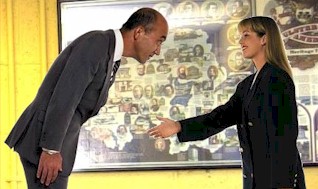|
|
|
Orly Borges Personal Collection |
|
 |
It is vital to
consider
the culture of the country
you are dealing with |
|
Many managers agree that an understanding of cultural
differences is essential when doing business
abroad. The
following cases illustrate what happens if business people
do not take into account
the culture of the countries they are
dealing with. |
|
|
The importance of the family
in Saudi Arabia
Mr Byrd was an ex-US State Department employee
hired by
a wellknown multinational corporation to be its "man in Riyadh", Saudi
Arabia. This retired American diplomat went to the home of a Saudi, Mr
Fouad, to try to interest him in participating in a local
joint venture
with his company. A
middleman
who knew them both had introduced them. As this was a first meeting, the
men's conversation began with small talk that made Mr Byrd a little
impatient.
Questions such. as "how are you doing? how was your flight? how is your
family? and how is your father?" were common. Mr Byrd, familiar with all
these obligatory formalities of greeting, answered "Fine". "Oh, my father,
yes, well, he is fine, but he is getting
a little deaf. I saw
him a few months ago during Christmas when we took him out of the nursing
home for a few days".
From that point everything
froze up.
Mr Byrd's mission was completely
derailed.
Mr Fouad remained gracious enough but was obviously uninterested in doing
any business with Mr Byrd. |
|
INTERPRETATION: The American did not realise the importance of the
family in this part of the world. It would have been
inconceivable for the Saudi
to have placed his father in the care of strangers. He therefore felt that
he could not trust Mr. Byrd as a business partner. |
|
The importance of "savoir
faire, savoir vivre" for the French
Jim Turner was attending a conference in Lyon. This was not
his first trip to France, and he was pleased some of the French colleagues
he had met previously remembered him. One evening they invited him along
for dinner and
began joking about the quality of the food. That surprised him. He
thought the food was really rather good and said so, expecting the
discussion to continue. But to his great discomfort, they then made some
joke about "food and Americans" and changed the subject. He felt somewhat
excluded and didn't know what he had done wrong. |
|
INTERPRETATION: The French
take
great pride in their food and wine and foreigners should be very
prudent about passing judgement on the quality of the food. In this case,
the Frenchmen obviously thought that the food at the restaurant did not
warrant such praise, and in their view, the American
revealed his lack of
savoir faire. |
|
The French need time to take a
decision
This incident was reported by a British management
consultant based in Paris:
"I had taken the American CEO of a
New York-based
consulting company to a first meeting with the three partners of a French
consulting firm in Paris. The negotiations did not go well. He hadn't been
in the boardroom for more than 15 minutes before he asked them what their
company's annual
earnings were. Without waiting for an answer to that question, he
suggested they give him an estimate of their firm's
market value,
as he was interested in making them an offer. I could feel things
freezing over". |
|
INTERPRETATION: In this case the American CEO had no undestanding of
the way the French approach business negotiations. In France, it is
important to spend time on preliminary discussions before mentioning
financial details. The executive did not build a proper relationship with
his counterpart through an exchange of views and therefore was perceived
as being
authoritarian. |
|
Why no one is eating?
A businesswoman recently asked why a high-level delegation
of visiting Japanese clients had not approached the breakfast buffet table
she had taken such
great pains
to prepare. "I'd
gotten out the good china and
silverware
and even brought in Japanese green tea for them, but no one touched a
thing!". |
|
INTERPRETATION: There are perhaps two problems in this case. The first
may concern the nature of the food the businesswoman served. The second
involves the rituals of
politeness
and the relationship between men and women. In many cultures, it is
considered normal to serve oneself. In the
male-dominated Japanese
business culture however, the guest would expect to be served,
particularly in this case, where the person organising the breakfast is a
woman. |
|
Source: Orly Borges Personal Collection |
|
GLOSSARY |
|
abroad: in a foreign country (en
el extranjero)
do not take into account: do not consider (no tiene en cuenta)
dealing with: visiting (visitando)
hired by: employed by (contratado por)
joint venture: a venture by a partnership designed to share risk or
expertise (emprendimiento, asociación)
middleman: interlocutor (interlocutor)
a little deaf: not hearing very well (un poco sordo)
froze up: suddenly became cold and formal (se congeló)
derailed: caused to run off the tracks (se descarriló)
inconceivable: unimaginable (inconcebible)
savoir faire: (French expression) social skill (tacto social) |
began joking: started kidding (comenzó a bromear)
take great pride in: are very proud of (se enorgullecen de)
revealed his lack of: showed an absence of (reveló su falta de)
New York-based: located in New York (radicada en Nueva York)
earnings: revenues (ingresos, ganancias)
market value: market price (valor de mercado)
freezing over: how the meeting became cold (cómo se congeló todo)
authoritarian: despotic, dictatorial (autoritario)
great pains: effortful attempt to attain a goal (denodados
esfuerzos)
gotten out: taken out (sacado)
silverware: tableware made of silver or stainless steel (platería)
politeness: civility (buena educación)
male-dominated: domínated by men (dominada por el hombre) |
|
|
|
|
MAS "NEGOCIOS"
FORO
INICIO |